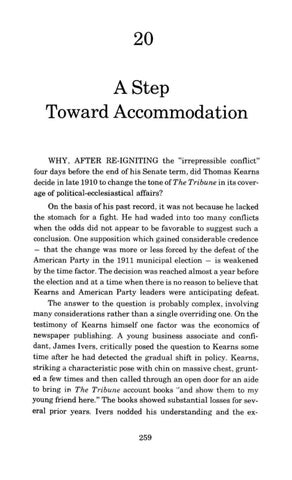20
A Step Toward Accommodation WHY, AFTER RE-IGNITING the "irrepressible conflict" four days before the end of his Senate term, did Thomas Kearns decide in late 1910 to change the tone of The Tribune in its coverage of political-ecclesiastical affairs? On the basis of his past record, it was not because he lacked the stomach for a fight. He had waded into too many conflicts when the odds did not appear to be favorable to suggest such a conclusion. One supposition which gained considerable credence — that the change was more or less forced by the defeat of the American Party in the 1911 municipal election — is weakened by the time factor. The decision was reached almost a year before the election and at a time when there is no reason to believe that Kearns and American Party leaders were anticipating defeat. The answer to the question is probably complex, involving many considerations rather than a single overriding one. On the testimony of Kearns himself one factor was the economics of newspaper publishing. A young business associate and confidant, James I vers, critically posed the question to Kearns some time after he had detected the gradual shift in policy. Kearns, striking a characteristic pose with chin on massive chest, grunted a few times and then called through an open door for an aide to bring in The Tribune account books "and show them to my young friend here." The books showed substantial losses for several prior years. Ivers nodded his understanding and the ex-
259







































